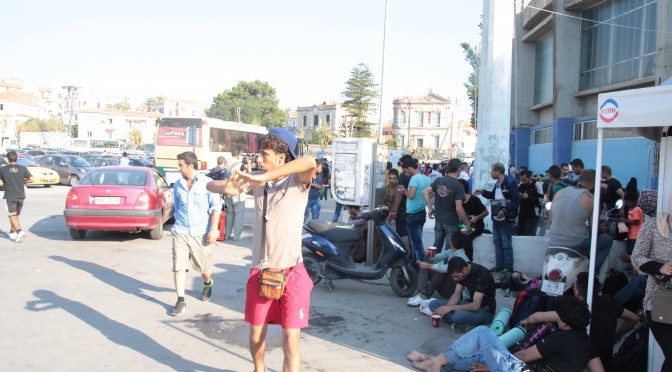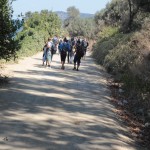
A LITTLE STORY ABOUT JUSTIFIED ANGER -> JOURNEY BACK TO THE BORDERS PART III
Just before I went on my trip to Mytilene I saw in Germany the news about refugees in Greece. On TV it was reported on how aggressive and angry the refugees were in Greece (Mytilene). After I saw these news in Germany about the refugees I started to think and worry a bit. Would it all go alright? Would it be right to travel to Mytilene and help the people who require support? Would I endanger myself or not? These questions formed in my mind. I travelled nonetheless as I had already booked my ticket and had promised the group that I would come and participate.
When our ship dropped the anchor in the harbour of Mytilene, I saw from above used rubber vessels and many people (men, women, and children) who did not look well and who had to wait in the heat for their registration. When we went to our camping site (Charamida), somewhere far away from the harbour and the city, we saw families and men, who were lying on the street as they could not walk anymore and were tired. We stopped and gave them water and information. We then quickly went to our camp and unloaded our car. When the cars were empty we drove back to bring the refugees to the harbour to register.
During my time on Lesvos I realised more and more that the people who arrived daily anew in small rubber vessels had desperately fled war and poverty as they did not want to be part of the killing and dying but wanted to survive. They are victims of dictatorships and military regimes and not faceless masses as they are often represented in the media. World politics turns them into refugees and migration politics (or the lack thereof) treats them like savages who are out of control. If I did not know better, I would also become scared.
The anger of the refugees is about the injustice that they encounter. Many of them are angry when they arrive in Greece and in the chaos of a humanitarian catastrophe where everything is missing and where hardly anyone is taken care of. One can only understand this anger when one talks to them and listens to their problems. They are angry because they have to wait with their children in the sun; they are angry because they did not get a share of the meal that comes once a day; they are angry because they and their families have nothing to wear and are suffering heat during the day and cold during the night. They are angry because they are treated unfairly; they are angry because they and their children and women are severely ill and cannot find a doctor; they are angry because they do not have any money left for food, tickets and so on, despite having to wait for days and weeks for their registrations. They are angry because they lost children, women, fathers, mothers, brothers and sisters on their journeys and they are angry because they have NOTHING MORE TO LOSE.
To all those who do not understand the anger of the refugees: inform yourselves, talk to the people who had to flee and do not be afraid to seek contact. Our index finger should point to the politicians and no to their victims.
Just before I went on my trip to Mytilene I saw in Germany the news about refugees in Greece. On TV it was reported on how aggressive and angry the refugees were in Greece (Mytilene). After I saw these news in Germany about the refugees I started to think and worry a bit. Would it all go alright? Would it be right to travel to Mytilene and help the people who require support? Would I endanger myself or not? These questions formed in my mind. I travelled nonetheless as I had already booked my ticket and had promised the group that I would come and participate.
When our ship dropped the anchor in the harbour of Mytilene, I saw from above used rubber vessels and many people (men, women, and children) who did not look well and who had to wait in the heat for their registration. When we went to our camping site (Charamida), somewhere far away from the harbour and the city, we saw families and men, who were lying on the street as they could not walk anymore and were tired. We stopped and gave them water and information. We then quickly went to our camp and unloaded our car. When the cars were empty we drove back to bring the refugees to the harbour to register.
During my time on Lesvos I realised more and more that the people who arrived daily anew in small rubber vessels had desperately fled war and poverty as they did not want to be part of the killing and dying but wanted to survive. They are victims of dictatorships and military regimes and not faceless masses as they are often represented in the media. World politics turns them into refugees and migration politics (or the lack thereof) treats them like savages who are out of control. If I did not know better, I would also become scared.
The anger of the refugees is about the injustice that they encounter. Many of them are angry when they arrive in Greece and in the chaos of a humanitarian catastrophe where everything is missing and where hardly anyone is taken care of. One can only understand this anger when one talks to them and listens to their problems. They are angry because they have to wait with their children in the sun; they are angry because they did not get a share of the meal that comes once a day; they are angry because they and their families have nothing to wear and are suffering heat during the day and cold during the night. They are angry because they are treated unfairly; they are angry because they and their children and women are severely ill and cannot find a doctor; they are angry because they do not have any money left for food, tickets and so on, despite having to wait for days and weeks for their registrations. They are angry because they lost children, women, fathers, mothers, brothers and sisters on their journeys and they are angry because they have NOTHING MORE TO LOSE.
The anger of the refugees is about the injustice that they encounter. Many of them are angry when they arrive in Greece and in the chaos of a humanitarian catastrophe where everything is missing and where hardly anyone is taken care of. One can only understand this anger when one talks to them and listens to their problems. They are angry because they have to wait with their children in the sun; they are angry because they did not get a share of the meal that comes once a day; they are angry because they and their families have nothing to wear and are suffering heat during the day and cold during the night. They are angry because they are treated unfairly; they are angry because they and their children and women are severely ill and cannot find a doctor; they are angry because they do not have any money left for food, tickets and so on, despite having to wait for days and weeks for their registrations. They are angry because they lost children, women, fathers, mothers, brothers and sisters on their journeys and they are angry because they have NOTHING MORE TO LOSE.
To all those who do not understand the anger of the refugees: inform yourselves, talk to the people who had to flee and do not be afraid to seek contact. Our index finger should point to the politicians and no to their victims.










Geen opmerkingen:
Een reactie posten